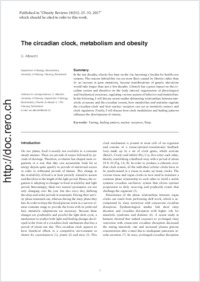The circadian clock, metabolism and obesity
- Albrecht, Urs Department of Biology, Biochemistry, University of Fribourg, Switzerland
-
01.02.2017
Published in:
- Obesity Reviews. - 2017, vol. 18, no. S1, p. 25–33
English
In the last decades, obesity has been on the rise becoming a burden for health care systems. The reasons behind this rise are most likely caused by lifestyle rather than by an increase in gene mutations, because manifestations of genetic alterations would take longer than just a few decades. Lifestyle has a great impact on the circadian system and therefore on the body internal organization of physiological and biochemical processes, regulating various aspects of behavior and metabolism. In the following, I will discuss recent studies delineating relationships between metabolic processes and the circadian system, how metabolites and nutrients regulate the circadian clock and how nuclear receptors can act as metabolic sensors and clock regulators. Finally, I will discuss how clock modulation and feeding patterns influence the development of obesity.
- Faculty
- Faculté des sciences et de médecine
- Department
- Département de Biologie
- Language
-
- English
- Classification
- Biological sciences
- License
-
License undefined
- Identifiers
-
- RERO DOC 280227
- DOI 10.1111/obr.12502
- Persistent URL
- https://folia.unifr.ch/unifr/documents/305240
Statistics
Document views: 105
File downloads:
- pdf: 752
